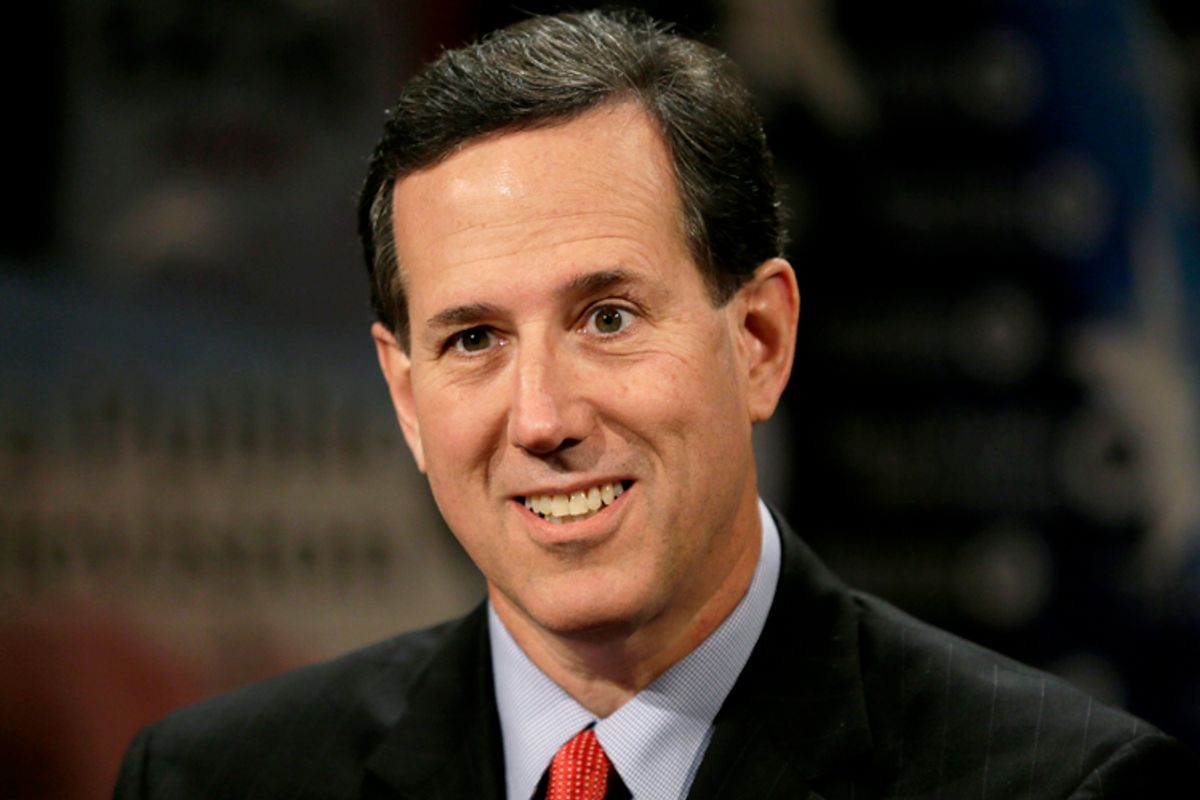As Americans brace themselves for Rand Paul’s just-announced presidential campaign, it is appropriate to take a quick look at the increasing political irrelevancy of another likely candidate, one who less than four years ago nearly wrested the Republican nomination from Mitt Romney.
I refer, of course, to former Sen. Rick Santorum (R-PA), who made headlines earlier this week by coming out in support of Indiana’s “Religious Freedom Restoration Act,” the controversial law that would allow business to discriminate against gay customers -- this in spite of the fact that even a large number of Republicans have joined Democrats, independents, and the general business community in denouncing the bill.
Before we explore the connection between Santorum’s stance on gay rights and his waning political star, it’s important to note that for the last 40 years, the heir apparent to the Republican presidential nomination has been the runner-up from previous years' primaries: See Ronald Reagan, George H. W. Bush, Bob Dole, John McCain, and Mitt Romney. If that precedent were still in effect, former Sen. Rick Santorum would at the very least rank among the handful of frontrunners. Instead he trails in the single digits, where he has been since the very beginning of this cycle's polling.
According to the Polling Report, he hasn’t reached 4 percent in more than a year.
The reason for this is as simple as it is monumental: Santorum’s political brand is linked to his staunch opposition to gay rights. Even a decade ago, that might have been enough to at least make him a strong contender in the GOP primaries. Today, however, Americans are moving inexorably in favor of full legal equality for the gay community. This has hurt Santorum considerably and, despite his other political weaknesses (most notably his landslide loss in the Pennsylvania Senate race in 2006), will in and of itself tank his chances at being president.
Even worse for Santorum, Republicans are far less religiously-minded in their politics than they’ve been in the past. While many conservatives are still quick to express ostensible support for using religion to shape government policies, 7 in 10 perceive religion as losing its influence in American life, with secular and/or non-Christian religious beliefs increasing in this country even as church attendance and specific denominational loyalties continue to decline. “Religion in general is not diminishing its social impact, but Christianity specifically is losing its authoritative power across society,” writes Professor Gary Laderman in The Huffington Post. “What we are witnessing today, and what has been especially visible in the past for some time now, is a process of dechristianization (not secularization).” Indeed, as Professor Mark Chaves noted in "American Religion: Contemporary Trends," even evangelicals are showing signs of shedding exclusionary attitudes and identifying less strongly with their religious background.
Although Christianity has been politicized in America since the earliest days of our republic, the Christian Right as we know it now is a particular and historically quirky breed, known for its religiously-tinted patriotism and conservative stances on issues like gay rights, the drug wars, opposition to the ‘60s counterculture, reproductive choice, and the separation of church and state. At least superficially, it continues to shape the GOP today, with 65 percent of Republicans telling a 2013 YouGov poll that they believe the United States has “gone too far in keeping religion and government separate” (as opposed to 36 percent of Independents and 18 percent of Democrats) and 55 percent favoring establishing Christianity as a state religion (as opposed to 30 percent of Independents and 26 percent of Democrats).
While there was no single moment when the Christian Right’s grip on the GOP began to weaken, signs have been emerging in the last two presidential elections. Neither John McCain nor Mitt Romney focused on their religiosity in their respective presidential campaigns -- which would have been unthinkable for a Republican presidential aspirant even a decade earlier. (In Romney's case, a determining factor was likely significant prejudice from the Christian Right due to his Mormonism. But the fact that this prejudice did not keep him from securing the nomination is in itself notable.) During that same period, religious conservatives found themselves losing touchstone cultural battles on issues like marijuana legalization, which is now supported by a majority of Americans, and gay marriage, with three-fourths of Americans now living in states that allow same-sex marriages. Even the religiously-based attacks on President Obama -- from rumors that he is a secret Muslim to the claim that he is attacking American Christianity -- have failed to gain traction beyond the converted.
None of this means that organized Christianity will stop being a factor in American politics anytime soon. At the same time, the days in which a candidate like Rick Santorum can play a dominant role in Republican Party politics may well be reaching their end.

Shares